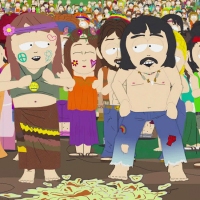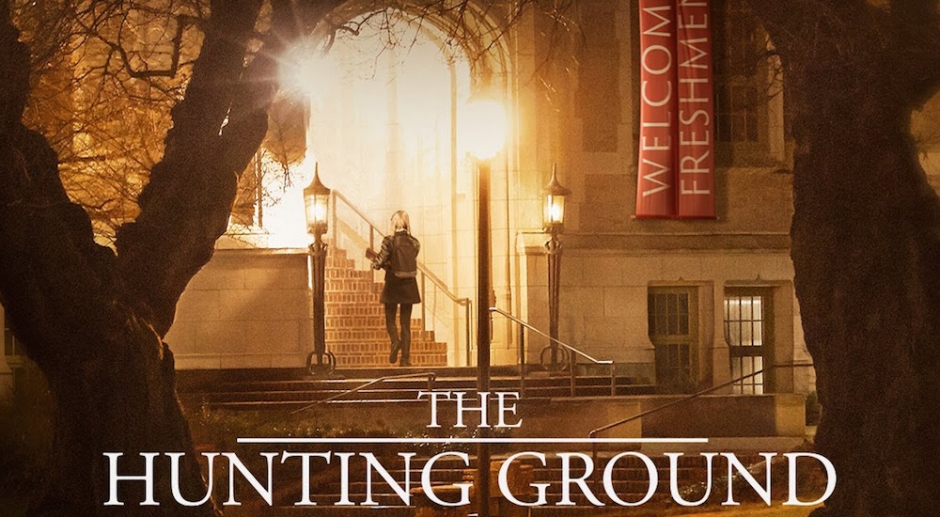 The Peace, Love & Insincerity Of Today's Modern Festival-GoerRolling a ciggie with one hand does not a hippie make.
The Peace, Love & Insincerity Of Today's Modern Festival-GoerRolling a ciggie with one hand does not a hippie make.

The Hunting Ground: the truth behind college sexual assault
A look behind frats, football and $100 bills.
This article focuses on the documentary The Hunting Ground, you can learn more about The Hunting Ground Australia Project with producer Allison Henry HERE.
The Hunting Ground is a recent feature documentary about sexual assault in American colleges, and it begins much like a fairytale; a compilation of YouTube clips filmed by proud parents as their children receive their college acceptance letters online or in the mailbox. There are tears of joy as for most American teenagers, attending college is a dream come true. For students like Kamilah Willingham, being accepted into Harvard Law is a sign that she is amongst some of the nation’s most intelligent and aspiring minds. In their promotional video Harvard takes the philosophy that ‘anything can happen’ for their prospective students:
However, this exact ethos is a cover-up for one of the most significant, yet invisible, injustices faced by a generation of young Americans to date - the rampant cases of sexual assault on College campuses in America.
As an Australian student at University, I will be lucky enough to go on study exchange to the US later this year. I admit like many US teenagers, I view college as a sort of Utopia. I am eagerly awaiting that All-American experience of living in a dorm, attending football games with 80,000 spectators and party hopping with my new friends. I received my acceptance letter the other week and was ecstatic. My admittance package included my fees, visa information, security procedures and even a small asbestos warning for my college building. What it failed to disclose was the most crucial warning of all: that there will be a one in five chance that I will be sexually assaulted or raped on campus during my time at college. I could be one of 100,000 students to be assaulted in the upcoming school year.
Something spelled out in Kirby Dick's feature documentary from last year, The Hunting Ground:
The film is a difficult watch. Is it agonising, taxing and one everyone should watch, to educate themselvs and understand that there is very good chance you know someone it has happened to. The nature of the crimes discussed in the film are shocking; men knock women unconscious in bathrooms to rape them, some pin girls to the ground to assault her whilst she’s begging them to stop, some guys smile whilst they are committing their monstrous acts and more often than not, females will be assualted not by stranges- but by someone they know. You will hear victims breakdown as they tell their stories. You will see their tears and the trauma on their faces. Their bravery forces us to examine the incredibly tough question of, 'how could anyone let this happen?'
The gravity of this issue is astounding and terrifying to say the least. It has been silenced and ignored for years, and Susan Marine from Harvard tells viewers the nightmare has now manifested into “part of the college experience” for students like me in 2016. It begs the question as to why such a tragic and brutal culture has come to be, and been allowed to continue. The answer, according to the documentary, is simple: institutions, financial incentives, fraternities and sport.
University of North Carolina rape victim Andrea Pino opens the documentary by stating, “Rape is a scary word”. It is so scary that colleges will do whatever is necessary to keep their reported number of incidents down to not detract from their image. When victims such as Pino, Kamilah Willigaham (Harvard) and Lizzie Seberg (Florida State University) disclosed their assaults to administrators, their institutional employees did whatever they could to dismiss the claims. “Were you drunk?” “What were you wearing?” “How many times did you say no?” “Why didn’t you fight him?” Otherwise known as, victim blaming. Assistant Professor Claire Bond Potter says, “Administrators’ first job is to protect the institution from harm, not the student from harm”. The more complex and taxing the report process, the less chance victims have following through. In 2012 45% of colleges did not report any sexual assaults. What’s even more absurd was the college’s lack of enforcement towards sexual perpetrators, all in the name of ‘protecting a brand’.
Money. It’s what makes or breaks anybody. For Ivy League schools like Harvard, who execute $6 billion investment campaigns, the possibility of lawsuits is one thing; the possibility of losing investors is another. So to avoid the courtroom, colleges deal with perpetrators themselves. Sanctions for perpetrators include: suspension over summer vacation, a fine, community service or an essay to reflect on their experience. But it is the likelihood of losing capital that frightens colleges the most. Why would Dartmouth, Princeton or Stanford disclose the accurate number of sexual assaults on their campuses if they were about to receive $200 million from a wealthy individual alone? No reasonable person would ever invest his or her money in a ‘rape college’. So colleges lie, and manipulate and exploit the vulnerability of victims to deter them from going to the police.

^Stats taken from The Hunting Ground.
Then, there’s the something quite foreign to us in Australia - Fraternity and Sorority life, filled with parties, booze, mansions, nice cars and poster-boy ‘brothers’, and also one of the core groups behind these heinous crimes. Their weapon of choice? Alcohol. You might have heard of some of the fraternity chapters; Pike, Alpha, Beta. SAE had one of the most well known nicknames: Sexual Assault Expected. Frats take pride in boasting their sexual conquests and sense of sexual entitlement. For example, they display picket signs like “Thank you for your daughters”, sing nighttime chants like “No mean yes!” and justify their acts with logic like “If a girl says no and you still have sex, if its just those two facts, does that automatically make you a rapist?” So why did they get away with it? An attorney in the film explains that fraternities and colleges have an informal contract to promote the school and bring in students. In many ways colleges are more dependent on the popularity of fraternities, than vice versa. Become a member of these boys clubs and you could be sure you and your buddies would be protected for the rest of your college life.
Finally there is idolisation of college sport. Sport departments in colleges are industries. Top football and basketball teams and players can bring in hundreds of million of dollars, attract free publicity through broadcasting contracts and can elevate a school's name exponentially. In turn, the school and fans treat their athletes as Gods - and Gods need to stay on their pedestal and on the team. When Florida State star QB Jamies Winston was accused of raping Erica Kinsman the public's response made a mockery of human compassion. Fans called her an attention seeking “slut”, “jealous” and sports journalists labeled her an opportunist preying on Winston’s fame. So what could authorities do if a star quarterback; who was segregated from the rest of the student cohort with a full-time training regime; was accused of such a crime? Nothing. Ex-Lieutenant Pat Cottrell, who patrolled Notre Dame as campus police, revealed the corrupt insitutional directive that shields athletes if a sexual accusation or report comes forward: “Police can not contact an athlete at any athletic facility and we can not contact any athlete to assist us in contracting the athlete.”
This way, boys could stay on the team, win the championship and the school becomes a national success. As the film outlines, the message was thus: if you were a ‘pleb’ seeking to take down something so integral to a school's identity like its varsity sport - you weren’t going to win.
I won't tell you the ending to the story, but I can tell you that it’s still continuing as I write this article, and the conversation around sexual assault on University campuses in Australia is only just gathering steam. I had the fortune of interviewing the film's Impact Producer Allison Henry, charged with helping spread the word about the film to a much larger audience. We discussed The Hunting Ground Australia Project, which is being rolled-out across Australian universities in 2016 - and you can read that interview HERE.
 The Peace, Love & Insincerity Of Today's Modern Festival-GoerRolling a ciggie with one hand does not a hippie make.
The Peace, Love & Insincerity Of Today's Modern Festival-GoerRolling a ciggie with one hand does not a hippie make.
 2:24PM On A Sunday, Reaching For The 12th BiscuitA self help guide for hungover existentialists.
2:24PM On A Sunday, Reaching For The 12th BiscuitA self help guide for hungover existentialists.